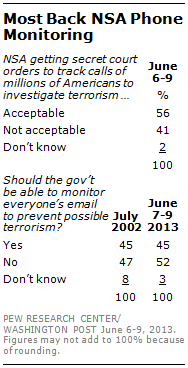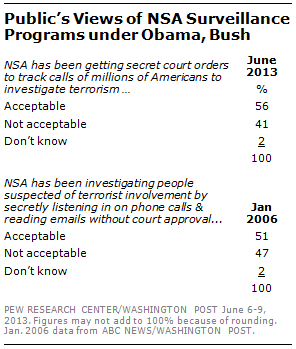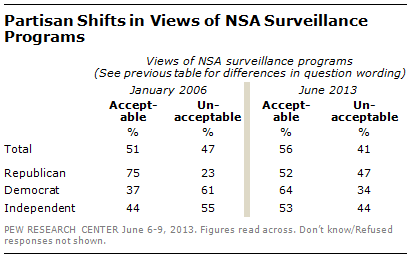Overview

A majority of Americans – 56% – say the National Security Agency’s (NSA) program tracking the telephone records of millions of Americans is an acceptable way for the government to investigate terrorism, though a substantial minority – 41% – say it is unacceptable. And while the public is more evenly divided over the government’s monitoring of email and other online activities to prevent possible terrorism, these views are largely unchanged since 2002, shortly after the 9/11 terrorist attacks.
The latest national survey by the Pew Research Center and The Washington Post, conducted June 6-9 among 1,004 adults, finds no indications that last week’s revelations of the government’s collection of phone records and internet data have altered fundamental public views about the tradeoff between investigating possible terrorism and protecting personal privacy.

Currently 62% say it is more important for the federal government to investigate possible terrorist threats, even if that intrudes on personal privacy. Just 34% say it is more important for the government not to intrude on personal privacy, even if that limits its ability to investigate possible terrorist threats.
These opinions have changed little since an ABC News/Washington Post survey in January 2006. Currently, there are only modest partisan differences in these opinions: 69% of Democrats say it is more important for the government to investigate terrorist threats, even at the expense of personal privacy, as do 62% of Republicans and 59% of independents.
However, while six-in-ten or more in older age groups say it is more important to investigate terrorism even if it intrudes on privacy, young people are divided: 51% say investigating terrorism is more important while 45% say it is more important for the government not to intrude on personal privacy, even if that limits its ability to investigate possible threats.

The survey finds that while there are apparent differences between the NSA surveillance programs under the Bush and Obama administrations, overall public reactions to both incidents are similar. Currently, 56% say it is acceptable that the NSA “has been getting secret court orders to track telephone calls of millions of Americans in an effort to investigate terrorism.”
In January 2006, a few weeks after initial new reports of the Bush administration’s surveillance program, 51% said it was acceptable for the NSA to investigate “people suspected of involvement with terrorism by secretly listening in on telephone calls and reading e-mails between some people in the United States and other countries, without first getting court approval to do so.”

However, Republicans and Democrats have had very different views of the two operations. Today, only about half of Republicans (52%) say it is acceptable for the NSA to obtain court orders to track phone call records of millions of Americans to investigate terrorism. In January 2006, fully 75% of Republicans said it was acceptable for the NSA to investigate suspected terrorists by listening in on phone calls and reading emails without court approval.
Democrats now view the NSA’s phone surveillance as acceptable by 64% to 34%. In January 2006, by a similar margin (61% to 36%), Democrats said it was unacceptable for the NSA to scrutinize phone calls and emails of suspected terrorists.
Public Divided Over Internet Monitoring

The public is divided over the government’s monitoring of internet activity in order to prevent possible terrorism: 45% say the government should be able to “monitor everyone’s email and other online activities if officials say this might prevent future terrorist attacks.” About as many (52%) say the government should not able to do this.
These views are little changed from a July 2002 Pew Research Center survey. At that time, 45% said the government should be able to monitor everyone’s internet activity if the government said it would prevent future attacks; 47% said it should not.
Young Differ on Principle, but Less on Practice
Younger Americans are more likely than older age groups to prioritize protecting personal privacy over terrorism investigations. Among people ages 18-29, 45% say it is more important

for the federal government NOT to intrude on personal privacy, even if that limits its ability to investigate possible terrorist threats. That view falls to 35% among those ages 30-49 and just 27% among those ages 50 and older.
There are smaller age differences when it comes to the specific policies in the news this week. When it comes to whether the NSA tracking of phone records is acceptable, nearly the same share of 18-to-29 year-olds (55%) say the program is acceptable as those ages 65 and older (61%). Younger Americans are as divided as the nation overall about whether the government should or should not monitor email and online activities in the interest of preventing terrorism.
One-in-Four Following NSA News ‘Very Closely’

Roughly a quarter (27%) of Americans say they are following news about the government collecting Verizon phone records very closely. This is a relatively modest level of public interest. Only another 21% say they are following this fairly closely, while about half say they are following not too (17%) or not at all (35%) closely.
Interest in reports about the government tracking of e-mail and online activities is almost identical: 26% say they are following this story very closely, 33% not closely at all.
As with most news stories, interest is far higher among older Americans than the young: one-in-three (33%) Americans ages 50-and-

older are following news about the government tracking phone records very closely. Among those ages 18-29, just 12% are following very closely, while 56% say they are not following closely at all.
Attention to these stories is higher among Republicans and Republican-leaning independents: 32% are following reports about the government tracking phone records very closely, compared with 24% of Democrats and Democratic-leaning independents. The partisan gap in interest is almost identical when it comes to reports about government collecting email and other online information: 30% of Republicans and Republican-leaners are following very closely compared with 20% of Democrats and Democratic-leaners.
Overall, those who disagree with the government’s data monitoring are following the reports somewhat more closely than those who support them. Among those who find the government’s tracking of phone records to be unacceptable, 31% are following the story very closely, compared with 21% among those who say it is acceptable. Similarly with respect to reports about government monitoring of email and online activities, 28% of those who say this should not be done are following the news very closely, compared with 23% of those who approve of the practice.




